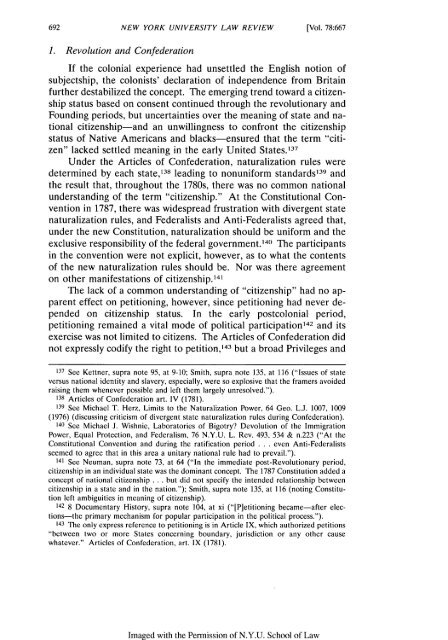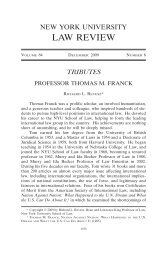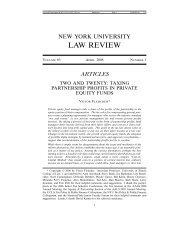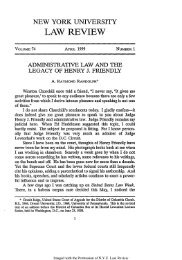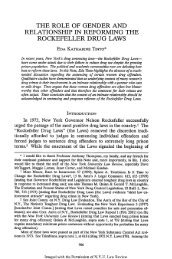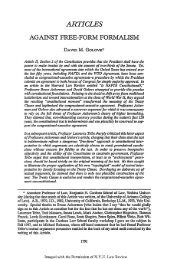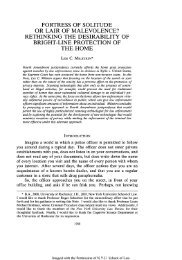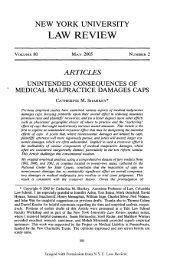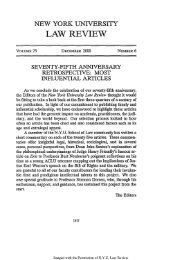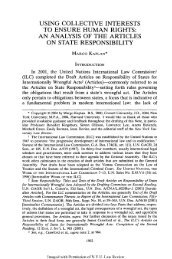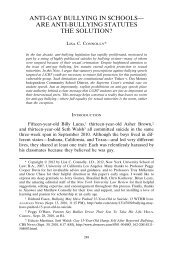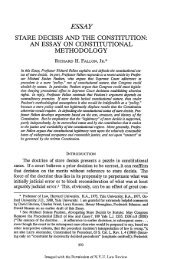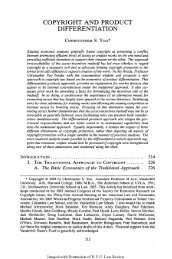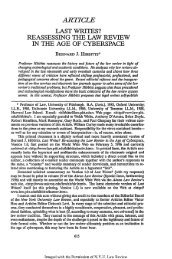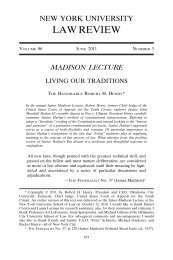Immigrants and the Right to Petition - NYU Law Review
Immigrants and the Right to Petition - NYU Law Review
Immigrants and the Right to Petition - NYU Law Review
Create successful ePaper yourself
Turn your PDF publications into a flip-book with our unique Google optimized e-Paper software.
Imaged with <strong>the</strong> Permission of N.Y.U. School of <strong>Law</strong><br />
NEW YORK UNIVERSITY LAW REVIEW<br />
[Vol. 78:667<br />
1. Revolution <strong>and</strong> Confederation<br />
If <strong>the</strong> colonial experience had unsettled <strong>the</strong> English notion of<br />
subjectship, <strong>the</strong> colonists' declaration of independence from Britain<br />
fur<strong>the</strong>r destabilized <strong>the</strong> concept. The emerging trend <strong>to</strong>ward a citizenship<br />
status based on consent continued through <strong>the</strong> revolutionary <strong>and</strong><br />
Founding periods, but uncertainties over <strong>the</strong> meaning of state <strong>and</strong> national<br />
citizenship-<strong>and</strong> an unwillingness <strong>to</strong> confront <strong>the</strong> citizenship<br />
status of Native Americans <strong>and</strong> blacks-ensured that <strong>the</strong> term "citizen"<br />
lacked settled meaning in <strong>the</strong> early United States. 137<br />
Under <strong>the</strong> Articles of Confederation, naturalization rules were<br />
determined by each state, 138 leading <strong>to</strong> nonuniform st<strong>and</strong>ards 139 <strong>and</strong><br />
<strong>the</strong> result that, throughout <strong>the</strong> 1780s, <strong>the</strong>re was no common national<br />
underst<strong>and</strong>ing of <strong>the</strong> term "citizenship." At <strong>the</strong> Constitutional Convention<br />
in 1787, <strong>the</strong>re was widespread frustration with divergent state<br />
naturalization rules, <strong>and</strong> Federalists <strong>and</strong> Anti-Federalists agreed that,<br />
under <strong>the</strong> new Constitution, naturalization should be uniform <strong>and</strong> <strong>the</strong><br />
exclusive responsibility of <strong>the</strong> federal government. 40 The participants<br />
in <strong>the</strong> convention were not explicit, however, as <strong>to</strong> what <strong>the</strong> contents<br />
of <strong>the</strong> new naturalization rules should be. Nor was <strong>the</strong>re agreement<br />
on o<strong>the</strong>r manifestations of citizenship. 141<br />
The lack of a common underst<strong>and</strong>ing of "citizenship" had no apparent<br />
effect on petitioning, however, since petitioning had never depended<br />
on citizenship status. In <strong>the</strong> early postcolonial period,<br />
petitioning remained a vital mode of political participation 142 <strong>and</strong> its<br />
exercise was not limited <strong>to</strong> citizens. The Articles of Confederation did<br />
not expressly codify <strong>the</strong> right <strong>to</strong> petition, 4 3 but a broad Privileges <strong>and</strong><br />
137 See Kettner, supra note 95, at 9-10; Smith, supra note 135, at 116 ("Issues of state<br />
versus national identity <strong>and</strong> slavery, especially, were so explosive that <strong>the</strong> framers avoided<br />
raising <strong>the</strong>m whenever possible <strong>and</strong> left <strong>the</strong>m largely unresolved.").<br />
138 Articles of Confederation art. IV (1781).<br />
139 See Michael T. Herz, Limits <strong>to</strong> <strong>the</strong> Naturalization Power, 64 Geo. L.J. 1007, 1009<br />
(1976) (discussing criticism of divergent state naturalization rules during Confederation).<br />
140 See Michael J. Wishnie, Labora<strong>to</strong>ries of Bigotry Devolution of <strong>the</strong> Immigration<br />
Power, Equal Protection, <strong>and</strong> Federalism, 76 N.Y.U. L. Rev. 493, 534 & n.223 ("At <strong>the</strong><br />
Constitutional Convention <strong>and</strong> during <strong>the</strong> ratification period . . . even Anti-Federalists<br />
seemed <strong>to</strong> agree that in this area a unitary national rule had <strong>to</strong> prevail.").<br />
141 See Neuman, supra note 73, at 64 ("In <strong>the</strong> immediate post-Revolutionary period,<br />
citizenship in an individual state was <strong>the</strong> dominant concept. The 1787 Constitution added a<br />
concept of national citizenship ... but did not specify <strong>the</strong> intended relationship between<br />
citizenship in a state <strong>and</strong> in <strong>the</strong> nation."); Smith, supra note 135, at 116 (noting Constitution<br />
left ambiguities in meaning of citizenship).<br />
142 8 Documentary His<strong>to</strong>ry, supra note 104, at xi ("[P]etitioning became-after elections-<strong>the</strong><br />
primary mechanism for popular participation in <strong>the</strong> political process.").<br />
143 The only express reference <strong>to</strong> petitioning is in Article IX, which authorized petitions<br />
"between two or more States concerning boundary, jurisdiction or any o<strong>the</strong>r cause<br />
whatever." Articles of Confederation, art. IX (1781).


